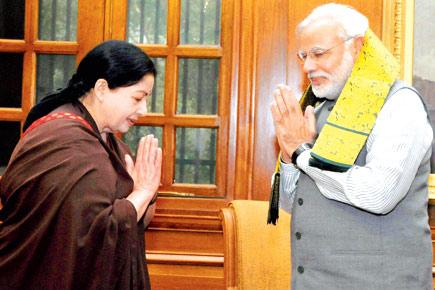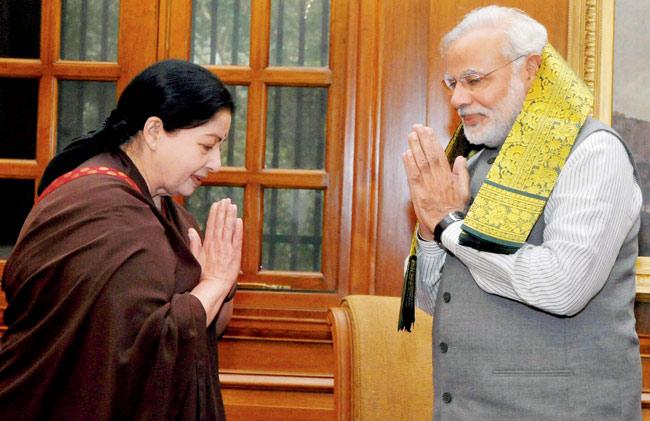I lived for some years in Ahmedabad and Dehradun in the early 2000s. There, I got used to speaking to most people in Gujarati and Hindi.

Tamil Nadu Chief Minister J Jayalalithaa and Prime Minister Narendra Modi
 I lived for some years in Ahmedabad and Dehradun in the early 2000s. There, I got used to speaking to most people in Gujarati and Hindi. When I moved back to Mumbai in the mid-2000s, I called an office and spoke to the person who answered the phone in Hindi, as I had gotten used to doing.
I lived for some years in Ahmedabad and Dehradun in the early 2000s. There, I got used to speaking to most people in Gujarati and Hindi. When I moved back to Mumbai in the mid-2000s, I called an office and spoke to the person who answered the phone in Hindi, as I had gotten used to doing.
However, she was clearly offended, replied in English and connected me to the person I had asked for in an audible huff. The same thing happened to me in shops and restaurants in Mumbai. People were appalled that I should speak to them in Hindi: the implication seemed to be that I was looking down on them. Yet, in Ahmedabad and Dehradun both, English did not work in those days.
ADVERTISEMENT

Linguistic war? The Union Home Ministry’s directive to use Hindi for interactions on social media was strongly objected to by Tamil Nadu Chief Minister J Jayalalithaa, who said that language was still a sensitive issue for many in the country. Pic/PTI
The belaboured point I am trying to make is that people choose and work their way around the language they want to speak. They also change and add more languages either from choice or necessity. As Indians, many of us speak and write more than one language anyway. But, the problems arise when politicians start pushing for language chauvinism, which is usually a ploy to appeal to their conservative vote banks with some additional pretence of safeguarding ‘culture’.
The little fracas over Hindi’s ascendancy we just witnessed over a Central government directive was one more little-thought-out move. We should have moved past those language fights of four decades ago. We must realise — or we are indeed unseeing and unconscious — how much the world has changed since then. And somewhere, we have to get it into the heads of our political ‘masters’ that every language is only good enough if it is an effective mode of communication. Archaic notions may please a few old men, but they are useless in the long run.
We know the double standards of politicians of course. We joke about it, but it is still true that politicians who are the most hung up on ‘mother tongues’ send their own progeny to English medium schools. This is as true in Mumbai as it is anywhere else. The Left took a formerly well-educated and academically solid Bengal back a few decades when it decided in the late 1970s that English education was an imperialist plot. We should really remind all of them that the yoke of colonial rule was removed years ago. Now, we have the right to choose. Left, right or centre, Indian politicians are unwavering in their misuse and manipulation of some vague notions of ‘culture’ to further some daft ends.
Of course, when it comes to preserving our heritage, whether it is monuments or dance forms or the performing and fine arts or classical music, we as a collective are least interested, and most politicians would fall asleep at a concert. They would much rather watch some commercial film full of culturally mixed and borrowed tunes and raunchy dance moves. Now, that’s a form of culture they would fight to preserve, while at the same time getting advice from khap panchayats and similar cultural institutions on how women should behave.
There is nothing wrong in preserving and encouraging our various national languages. By all means, provide support to writers and to littérateurs. Give generously to universities to promote the glory of all Indian languages. Apply to our academics for ideas. Do something worthwhile, in other words. Don’t create divisions and get people’s backs up. And unfortunately, that is what a return to Hindi chauvinism in officialdom does. We all know that more people speak and understand Hindi across India than ever before. But, this has been a ‘soft power’ coup, not a government directive’s success.
I must admit though that although I am fairly fluent in Hindi and can speak and read and write it, I am still at a loss in north India. The accents defeat me and in spite of friends from Uttar Pradesh telling me that my Hindi is adequate, I still use a number of Marathi words that flummox others.
Sometimes, I have found here in Dehradun, now in 2014, that English works a little better than these contrasting versions of Hindi. Please don’t tell the government that I just said that.
Ranjona Banerji is a senior journalist. You can follow her on twitter@ranjona
 Subscribe today by clicking the link and stay updated with the latest news!" Click here!
Subscribe today by clicking the link and stay updated with the latest news!" Click here!







